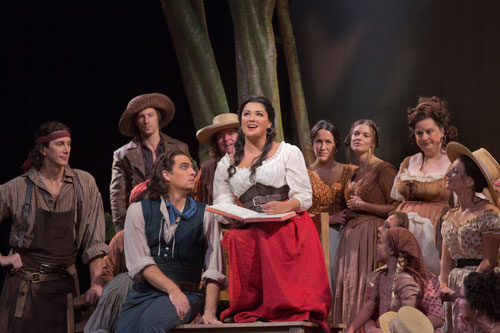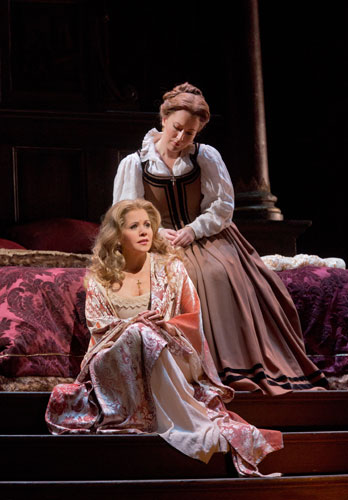Mario Hamlet-Metz
Metropoliten Opera: Donizetti's Elexir and Verdi's Otello

The Elixir of Love
Anna Netrebko (Adina), Matthew Polenzani (Nemorino)
Photo Ken Howard | Metropolitan Opera
The Elixir of Love was the last performance that we saw last season and the first one we attended in the current one. The 20-year old more or less caricaturesque production mounted for Luciano Pavarotti and Kathleen Battle in 1991 was finally replaced by a new one signed by the dynamic team of Michael Yeargan (sets), Bartlett Sher (producer) and Catherine Zuber (costumes) and served as a season opener on September 24, 2012. The choice of a Donizetti opera for a second year in a row (Anna Bolena in 2011) may seem strange to some opera lovers and especially critics but Mr. Gelb, the able and visionary General Manager, seems to know exactly what he is doing, was willing to take the chance, and proved to be right, once again, as the popular and much-loved opera scored a huge success and won practically universal appraise. (The live in HD telecast was seen by 3 million spectators in 1900 theatres in 64 countries, from Asia to South America.)
Visually, this production stayed well within the frame of the purest tradition, which may have been one of the reasons of its success. In it we saw a bright countryside background in all its simplicity, rusticity and naivete, where the overall calm was interrupted only twice, with the respective arrivals of the cocky Sergeant Belcore and the charlatan Doctor Dulcamara. The beautiful pastel costumes, except for those more colorful ones used by the Belcore and his military unit and those of Dulcamara, were in perfect agreement with the peaceful reigning atmosphere and the concept that the producer wanted to convey. Mr. Sher, who had given us his purely “buffo” Barber of Seville, understood, rightly so, that the storyline of The Elixir is quite different insofar that the “buffonate” are only part of the plot and are reserved mostly to the Sergeant and the quack, while the two main characters act in a very different manner: Behind his simplicity, Nemorino is a tender, sweet peasant boy who is willing to sacrifice everything, including his life, for the girl he deeply loves (“Perche non sono amato, voglio morir soldato”) while Adina evolves from her initial almost cruel indifference to her final melting and conceding that she really loves Nemorino (“Sappilo alfin, tu mi sei caro”). Sher’s concept was mainly based then on the psychological game between the two young lovers and had as a result the internalizing of the action. A valid concept, perhaps, but I don’t know if in the long run it is worthwhile to deepen the meaning of a poetic/bucolic and rather superficial or, at least, naive text. Romani is not Da Ponte.
Anna Netrebko was an exquisite Adina who acted and sung with her usual spontaneity. It is true that the voice is getting a bit heavy for this type of role and that a change of repertory is imminent (she will be Tatiana in next season opening night) but thus far it hasn’t lost any of its purity, its warmth, its agility, its easily-produced high register. During her last act aria “Prendi, per me sei libero” she took a note in mezzo forte, seemed to play with it upwards and finished the line producing the most limpid sound and the most perfect legato singing possible. Moreover, there is the fact that Miss Netrebko seems to be truly enjoying herself on stage, moving with such naturalness and grace that the responsive audience cannot help but fall for her hypnotizing charm. A charismatic, great singing actress she is indeed.

Otello
Renee Fleming (Desdemona)
Photo Ken Howard | Metropolitan Opera
Matthew Polenzani gave us a vocally and musically perfect Nemorino. His instrument has a beautiful, clear sound and is generous both in volume and in extension. The character was sympathetic, sincere and less buffoonish than usual, as the producer wanted. His interpretation, however, lacked that necessary dose of boyish tenderness that ultimately makes the character so endearing and often brings tears to our eyes. Words like “Quest’oggi, Adina, no!” should not pass inadvertendly.
Marius Kwiecien, who was Belcore during the last run of the old production last year, returned for the new one this year for the Bartlett Sher version, who makes him more abusive, not only with Nemorino, but with the rest of the characters as well. In his exaggerations, we would have preferred him less boisterous and more buffo. From the purely vocal standpoint, the role doesn’t pose any difficulties to this singer, who is rapidly approaching the peak of his career. (He will be Oneguine to Netrebko’s Tatiana next season.)
The Italian baritone Ambrogio Maestri sang with much poise and personality and gave us a comic yet very human Dulcamara. Mr. Maestri is a voluminous man with a voluminous well timbred and well schooled voice which we would like very much to hear in other roles.
The presence of Maurizio Benini on the podium has become almost indispensable for this repertory. Always attentive, orchestra, chorus, and soloists followed his rapid, lively baton blindly. Strangely enough though, in this particular performance, the maestro seemed a bit nervous, agitated, as if something were bothering him. A passing malaise, for sure.
After a lengthy absence, maestro Semyon Bychkov was in charge of conducting the revival of Verdi’s Otello. Bychkov imposed himself from the very beginning during the ferocious storm scene and continued throughout the performance showing a strong personality through precise and secure attacks, a firm control of sounds and rhythms and establishing a perfect balance between pit and stage.
The beautiful, spacious sets designed by Michael Yeargan for the Elijah Moshinsky 1994 production are still valid in its looks. It reproduces beautifully the Mediterranean atmosphere, one that is so apt for the explosion of violent behavior and passions. In Act I, a huge descending esplanade takes us from the entrance of the fortress to the sea. Terrified by the menacing storm, the islanders sing toward the audience (the sea) and turn sideways to watch and admire their Duce as he descends from the ship triumphantly, having defeated both the enemy and the elements. There, we see subsequently the Cypriots celebrating the victory, the fight/duel before and lastly the serene, almost angelical figure of Desdemona going towards the enamored husband, who at her sight, recovers his calm. In Act II, the spacious Othello study occupies a first level where Iago begins his perfidious exploitation of Otello’s jealousy, while on a bit higher ground, we see Desdemona’s garden, revealing her obvious purity. Act III is, visually, the most beautiful one, with its huge marble columns and a big painting that is raised for the Council scene. A minimum of decorative elements gives some intimacy to the final act. In these enormous open spaces, Otello, a vulnerable hero and Desdemona, an innocent victim move like puppets, walking unconsciously towards their uncalled-for destruction caused by the evil Iago. But these spaces also leave the protagonists totally exposed to the audience and forces them to prove at every moment their ability to act and to sing, which in the case of this opera, gives ground to a constant tour de force.
Desdemona has always been, understandably so, one of Renee Fleming’s favorite roles. The purity of the voice, the ability to increase the volume and to expand the sound once it gets to the right note and to reduce to pianissimo thereafter with absolute breath control together with a noble physical appearance and behavior, make of this elegant singer a unique character. Two very different scenes were particularly accomplished in her interpretation: her confrontation with the blindly jealous husband in Act III, where she defends her innocence vehemently and during the final scene, where Ms. Fleming succeeded in keeping the audience in absolute silence, listening in awe to the series of pianissimi and filati of both the “Willow Song” and the “Ave Maria”.
After an unfortunate evening, tenor Johan Botha was replaced by the Russian tenor August Aminov, who made a surprising and courageous last minute debut in one of the most demanding parts of the entire repertory. “The twelve hardest bars of Opera”, as the entrance of Otello is described, gave us an initial very positive impression, as we heard a potent, muscular, heroic voice. Then, during the duet that ends Act I, the sound became effortlessly lyric, without losing its virility. The real test for the singer came in Act II, where he gave it all at the beginning, (“Ora e per sempre Addio” was delivered with resolve) but arrived at the end with obvious signs of fatigue. In the last two acts, Amonov recovered his strength and seemed to have his instrument under better control. In fact, “Dio mi potevi scagliar” and “Niun mi tema” found him in full audible voice but there, the character seemed a bit short of the tragic stature required for a complete portrait of the Moor. All in all, a welcome debut.
Falk Struckmann was the Iago. His baritone doesn’t have a particularly attractive sound but was incisive and pungent, which helped beautifully in stressing and inflecting appropriately to express the character’s evil to its full extent.
A promising young Renee Tatum was Emilia and the veteran James Morris was Lodovico. Completing the cast were Stephen Gaertner (Montano), Michael Fabiano (Cassio), Eduardo Valdes (Roderigo) and Luthando Quave (Herald).


